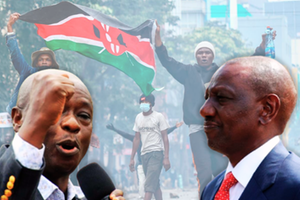Kenya’s HIV fight bolstered with Sh43b injection from the US

The HUV funding will support the second year of the PEPFAR programme in Kenya,
What you need to know:
- The funding will support the second year of the PEPFAR programme in Kenya, which aims to assist orphans, vulnerable children, and caregivers by providing essential school materials such as scholastic materials, school uniforms, backpacks, school fees, and sanitary pads.
- Implementation will begin on October 1, 2024, and end on September 30, 2025.
Kenya has received a boost of Sh43 billion from the United States towards aid in the fight against the Human Immunodeficiency Virus (HIV).
he funding will support the second year of the PEPFAR programme in Kenya, which aims to assist orphans, vulnerable children, and caregivers by providing essential school materials such as scholastic materials, school uniforms, backpacks, school fees, and sanitary pads.
Implementation will begin on October 1, 2024, and end on September 30, 2025. The announcement was made during a meeting between Kenyan and US government officials, including Susan Nakhumicha, Cabinet Secretary for Health, Global Aids Coordinator Dr John Nkengasong, and America Ambassador to Kenya Meg Whitman. During the meeting, Ms Whitman said Kenya was likely to end Aids infections in children by 2027.
The announcement comes months after controversy driven by a group of Kenyan parliamentarians, including Paul Katana, George Kaluma, Joyce Kamene, Charles Nguna, Caroline Ngelechei, Suzanne Kiamba, Beatrice Ogola, Farah Maalim and Joseph Kahangara. The 10 had written to the US Congress, claiming that the funding was being used to drive family planning and reproductive health, including procurement of abortions.
However, civil societies protested the move, saying that lack of funding would jeopardise the lives of at least 55 million Kenyans who are beneficiaries of the PEPFAR (The US President’s Emergency Plan for Aids Relief) programme saves lives, prevents HIV infections, and accelerates progress toward achieving HIV/Aids pandemic control in more than 50 countries around the world. Programme and more than 1.6 million Kenyans living with HIV.
Peter Gwengi, the Executive Director of Lake Victoria Initiatives, an organisation that advocates for the rights of people living with HIV in Migori County, expressed concern about a recent notice from some donors to decrease the HIV/Aids budget by 13 per cent.
While acknowledging the funding, he remained wary of the negative impact it could have on the community and the fight against HIV and Aids in the region.
“If you look at programmes that fight HIV, malaria, and tuberculosis, you will find that the landscape is dominated by partners, including funding, planning, activities, and even monitoring. You go to health facilities that have been opened to bring health services closer to the people and find that the personnel are also being supported by donors. So it means that when partners are going to pull out, even some of these health facilities will be closed because there will be no personnel to run them," he fears.
Gwengi, who has been living with HIV for 30 years, fears these cuts, coupled with potential future reductions from funding organisations, could significantly impact HIV services in Kenya. He emphasises the need for the Kenya government to increase domestic funding for HIV programmes.
“We are also pushing the county government of Migori to pass legislation that will insulate the money being allocated for these three diseases. You know, sometimes when they do supplementary budgets, you find that money is being moved again from certain budget areas to other areas.”
“There should be legislation that will enhance the money we are discussing. So even if we say we are pushing for the allocation of more money for HIV, this money is protected. It is not left to abuse," he explains.
Kenya currently faces a generalised HIV epidemic, meaning it affects all populations. While the national adult HIV prevalence rate has dropped significantly from 10 per cent in the late 1990s to around 4.5 per cent in 2020, challenges remain. Women are disproportionately affected, and some counties grapple with higher infection rates.






